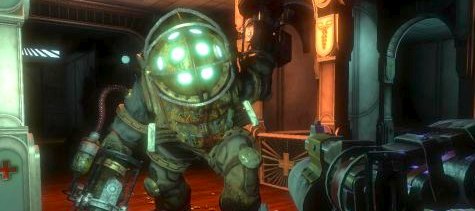or: trust the designer, not the mechanic.

I have a problem with not finishing games. I doubt I am the only one. But sometimes I become disappointed with my inability/lack of time to finish a game, and Bioshock is one title I’m disappointed not to have put more time into.
Most games stop being played either because my interest wanes or beacuse they demanded too much time. Bioshock did neither. Bioshock was, whilst I was playing it, wonderful: simple mechanics, but deep design; beautiful architecture; solid story-telling.
I was really enjoying it, and really into it – and then we broke up. We broke up because of what it asked me to do.
It sent me on a fetch-quest. Now, I’ve done my fair share of fetch quests; indeed, I wonder what the number of man hours spent finding red keycards to put in red doors must be. But when Bioshock asked me to go on said quest, it took the biscuit.
I think it was partly because it was coming from such an otherwise good game. Bioshock is, no question of it, a shooter – but it’s a shooter with enough brains and heart to provide a context and a reason for everything you do. And shooters send you on fetch quests. This is a given.
However, sending me on a fetch-quest to collect twenty-one items just made me want to throw the controller through the screen. Specifically: you’re asked to collect seven each of three types of reagent. I wouldn’t have minded so much, if I hadn’t acquired two of one type so far; these two reagents fell from corpses, and rather-too infrequently. The quest sounded like it would take ages, and involve lots of backtracking. Markedly annoyed, I removed the disc, and soon was playing other games instead.
With hindsight, I should have credited Bioshock with a bit more intelligence.
I fired up it up today, interested in returning to Rapture – a game-world I had otherwise loved – to see if I was being harsh. It turns out that I was.
Firstly: there’s very little backtracking. Almost immediately, Atlas, the disembodied character that instructs the player for much of your journey, tells you that you might want to go to the Farmers’ Market. This is a new area of Arcadia, so there’s the prospect of more exploration and story. Sure enough, both here, and in the whisky distillery, you find an awful lot of one reagent (distilled water, if you’re interested). The second type of reagent is an enzyme synthesized from bees. It turns out that all the enzyme you require can be found in a single room, which contains a nifty combat-based puzzle. And, of course, by the time you’ve been through these areas, you’ll have downed enough of a particular type of enemy to acquire enough of the last reagent (chlorophyll).
And, of course, there were lots of upgrades and audio-diaries to discover, not to mention yet more of the game’s beautiful architecture. An hour and a bit later, and we’re back on track after what wasn’t dull at all.
So why did I give up? I think that the game triggered some innate, gamer pre-conditioning about involved fetch-quests. The game had been smarter up until that point; now, it seemed like it was making a cardinal error. I should have been more trusting: it was all just fine in the end. But it’s easy to forget as a designer that whilst your gamem (or, indeed, software product) may do everything a notch smarter than everybody else’s… you still need to make sure you don’t trigger their gut reactions from previous bad experiences. I was thrown by the instructions the game gave me; its characters and landscape soon illustrated the error of my ways.
And as for Bioshock? Well, we happily seem to be on again – at least for the time being.